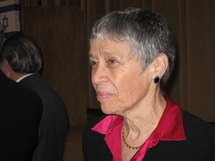
Gabriela Shalev
"Unlawful and provocative Israeli policies and actions (are) casting a dark shadow on the efforts to resume the peace process, raising grave doubts about Israel's credibility as a peace partner and its willingness to abide by legal obligations and commitments," Ryad Mansour, the Palestinian observer to the UN, said.
He told council ambassadors that Israel's refusal to cease all settlement activities "in the Occupied Palestinian Territory, including in and around Jerusalem," represented "a major obstacle" to the peace process.
"We reiterate that such cessation is essential for the resumption of a credible process aimed at achieving the two-state solution on the basis of the pre-1967 borders," he noted.
But Israel's outgoing UN Ambassador Gabriela Shalev responded that while her country was "prepared to take political risks for peace," it would never compromise on its security.
She said the Jewish state was now facing "more diverse and dangerous" threats, including "the rockets of Iranian proxies Hamas and Hezbollah, global terrorism and the pursuit of nuclear weapons by Iran."
"A settlement must mean a definite end to the conflict that involves mutual recognition," she noted. "Peace is not merely a signed document. it is a set of values that allow us to live our lives in security and with hope -- Israelis and Palestinians alike."
Mitchell, who started indirect talks between Israel and the Palestinians in May, met Israeli Prime Minister Benjamin Netanyahu on Sunday, a day after talks with Palestinian president Mahmud Abbas.
The Palestinians have long demanded a complete freeze on Israeli settlement expansion ahead of direct talks and have accused Israel of undermining the process by approving new settler homes in annexed Arab east Jerusalem, which they want as the capital of their promised state.
------------------------------------------------------------------------
He told council ambassadors that Israel's refusal to cease all settlement activities "in the Occupied Palestinian Territory, including in and around Jerusalem," represented "a major obstacle" to the peace process.
"We reiterate that such cessation is essential for the resumption of a credible process aimed at achieving the two-state solution on the basis of the pre-1967 borders," he noted.
But Israel's outgoing UN Ambassador Gabriela Shalev responded that while her country was "prepared to take political risks for peace," it would never compromise on its security.
She said the Jewish state was now facing "more diverse and dangerous" threats, including "the rockets of Iranian proxies Hamas and Hezbollah, global terrorism and the pursuit of nuclear weapons by Iran."
"A settlement must mean a definite end to the conflict that involves mutual recognition," she noted. "Peace is not merely a signed document. it is a set of values that allow us to live our lives in security and with hope -- Israelis and Palestinians alike."
Mitchell, who started indirect talks between Israel and the Palestinians in May, met Israeli Prime Minister Benjamin Netanyahu on Sunday, a day after talks with Palestinian president Mahmud Abbas.
The Palestinians have long demanded a complete freeze on Israeli settlement expansion ahead of direct talks and have accused Israel of undermining the process by approving new settler homes in annexed Arab east Jerusalem, which they want as the capital of their promised state.
------------------------------------------------------------------------









 Home
Home Politics
Politics









